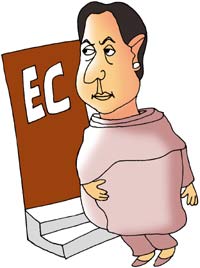
Why does the Congress dislike Jaya Bachchan?
The Samajwadi Party is determined to send Jaya Bachchan back to the Rajya Sabha, but is frustrated by the Election Commission's refusal to schedule the by-election anytime soon.
In sharp contrast to the alacrity with which the Commission held the by-election in Rai Bareli within a couple of weeks of Sonia Gandhi's resignation (thus allowing her to come back to the Lok Sabha without missing a single working day), it is clearly dragging its feet on holding by-elections to fill the two vacancies in the Rajya Sabha from Uttar Pradesh.
Bachchan lost her membership after the Commission upheld a complaint of a Congress member on the ground that she held an office of profit as head of the UP Film Council. The other vacancy arose following the resignation of industrialist Anil Ambani, who was also elected with the support of the Samajwadi Party.
Apparently, the Commission finds itself immobilised by a long-pending complaint by another Congress member in the Allahabad high court, saying that his nomination papers for the July 2004 biennial election to the Rajya Sabha were unfairly rejected.
That Congress bosses remain obsessed with Jaya Bachchan ought to be further clear from the insertion of a special clause in the recently passed Parliament (Prevention of Disqualification) Bill 2006, which specifically states that 'it shall not entitle a person who has vacated a seat owing to any judgment of court to claim reinstatement.'
Aside from Bachchan -- whose disqualification was endorsed by the apex court when it refused to hear her plea against the Election Commission order -- no other member had been disqualified. For all other MPs who might otherwise have been in violation of the said constitutional provision, relief was provided with retrospective effect by amending the law operative since April 4, 1959.
Rent-a-crowd counter protest Like it not, as there was no agitations against the OBC reservations proposal for so long, its chief sponsor Arjun Singh was most miserable. The HRD minister could expect to emerge as the messiah of the OBCs only if there were prolonged street protests against reservations. The more they protested, the more he hoped to firm up his public profile as benefactor of the electorally significant OBCs, especially in his home state of Madhya Pradesh, where his politician-son Ajeya Singh aspires to occupy the chief ministerial seat soon.
Like it not, as there was no agitations against the OBC reservations proposal for so long, its chief sponsor Arjun Singh was most miserable. The HRD minister could expect to emerge as the messiah of the OBCs only if there were prolonged street protests against reservations. The more they protested, the more he hoped to firm up his public profile as benefactor of the electorally significant OBCs, especially in his home state of Madhya Pradesh, where his politician-son Ajeya Singh aspires to occupy the chief ministerial seat soon.
With doctors in large parts of the country coming out against reservations, Arjun Singh unfolded the second part of his plan to wrap himself in OBC colours. This time, he got retainers in the Delhi Congress party to float a pro-reservation front and confront the protesting doctors head-on.
An old protégé of Arjun Singh whom the latter had helped get the party ticket for the local assembly election twice was directed to take the lead in organising a rent-a-crowd rally at Jantar Mantar in the vicinity of Parliament House on Wednesday. This fixture in the Arjun Singh durbar roped in a couple of local Congress leaders to do the needful.
Camels through the needle's eye According to senior faculty members at the All India Institute of Medical Sciences, if Arjun Singh's proposal to provide reservations for OBCs in medical colleges goes through, only nine candidates out of over 100,000 who sit for an all-India entry test every year will get admission in the general category.
According to senior faculty members at the All India Institute of Medical Sciences, if Arjun Singh's proposal to provide reservations for OBCs in medical colleges goes through, only nine candidates out of over 100,000 who sit for an all-India entry test every year will get admission in the general category.
The remaining 400-plus seats will be filled by various reserved categories. Whether or not these candidates for the reserved categories fulfil the minimum criterion for admission is, of course, another matter -- one of seemingly no concern to the reservation mongers.
Bizarre electoral process
More on the Election Commission. There clearly is a lacuna in the law governing by-elections to the Rajya Sabha. As a concrete example, consider the recent vacancy caused by Pramod Mahajan's death.
The BJP member of the Rajya Sabha was elected from Maharashtra in the last biennial election on the principle of proportional representation. However, the seat will go to the ruling Congress-Nationalist Congress Party combine when the by-election is held, because the principle of proportional representation will virtually stand nullified by a simple majority versus minority vote which will come into play when there is a lone seat on offer.
How the Commission will rectify this is not clear, but it violates the principle of proportional representation as enshrined in the Constitution.
Parivar's popularity!Public memory is proverbially short. Recall the countrywide protest mounted by Sangh Parivar outfits against the arrest of Kanchi Shankaracharya Jayendra Saraswati. AIADMK Chief Minister J Jayalalalithaa was demonised by the Parivar for arresting the Hindu pontiff on charges of murder.
Well, it is a comment on the collective Hindu mind in general and the standing of the Sangh Parivar in the community in particular that in the recent election to the Tamil Nadu assembly from the Hindu-dominated Mylapuram constituency -- where the Kanchi Math is located -- the winner is Jayalalithaa's party.
Exemption pleaseWhen the Lok Sabha debated the Parliament (Prevention of Disqualification) Amendment Bill 2006, Speaker Somnath Chatterjee excused himself from presiding over the proceedings as he was to be one of the beneficiaries of the proposed law. Deputy Speaker Charanjit Singh Atwal was in the chair.
Atwal interrupted Law Minister Hans Raj Bhardwaj to ask if the Shiromani Gurdwara Prabhandak Committee figured in the list of exempted organisations as he has been its long-time sewak and had no intention of severing ties with the SGPC. The Deputy Speaker felt reassured when told that the exemption given to all MPs who were members of trusts and societies under the Societies Registration Act would duly cover the SGPC as well.
Long live sycophancy! With Priyaranjan Dasmunsi as information and broadcasting minister, State-controlled radio and television has reverted to the 1970s when these were unabashed tools of ruling party propaganda. To be fair, Jaipal Reddy, Dasmunsi's predecessor, was careful not to exploit AIR or Doordarshan for self-promotion or propaganda.
With Priyaranjan Dasmunsi as information and broadcasting minister, State-controlled radio and television has reverted to the 1970s when these were unabashed tools of ruling party propaganda. To be fair, Jaipal Reddy, Dasmunsi's predecessor, was careful not to exploit AIR or Doordarshan for self-promotion or propaganda.
Dasmunsi has, however, brought to bear his rough methods as former Youth Congress leader on AIR and DD. This would explain why the minister gets big play on both radio and television whenever he feels obliged to say something.
He also ensures that Sonia Gandhi is given a prime slot. Her re-induction into the Lok Sabha may have been a mere footnote for the rest of the media, but it was headline news on AIR and DD. It was not enough to note that she took the oath as a member, State radio and television also insisted on relaying the entire footage of her reading aloud the full text of the oath.
Illustrations: Uttam Ghosh




